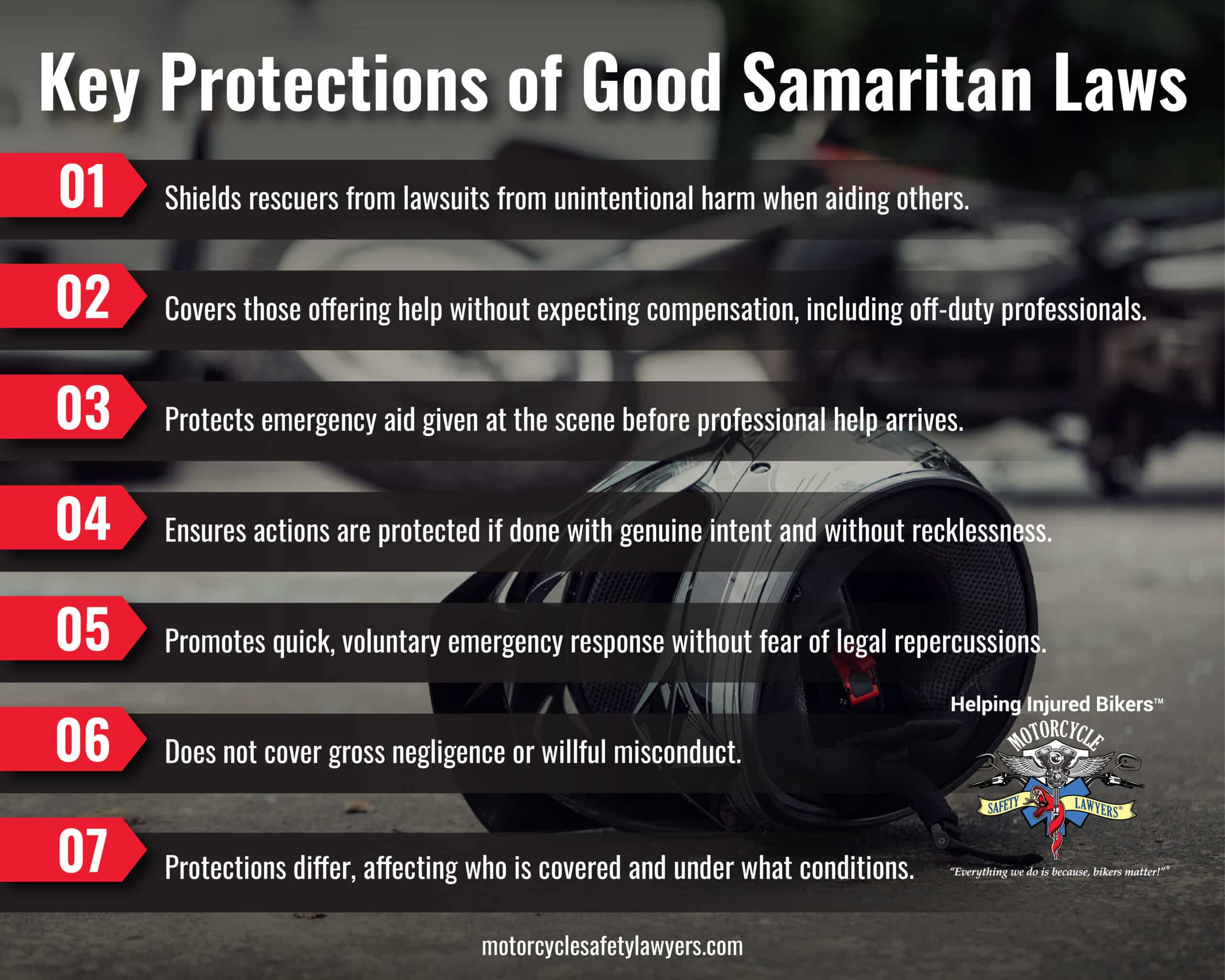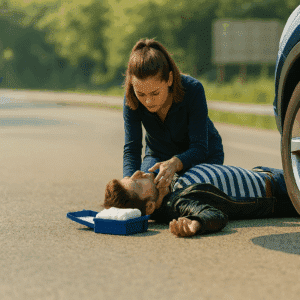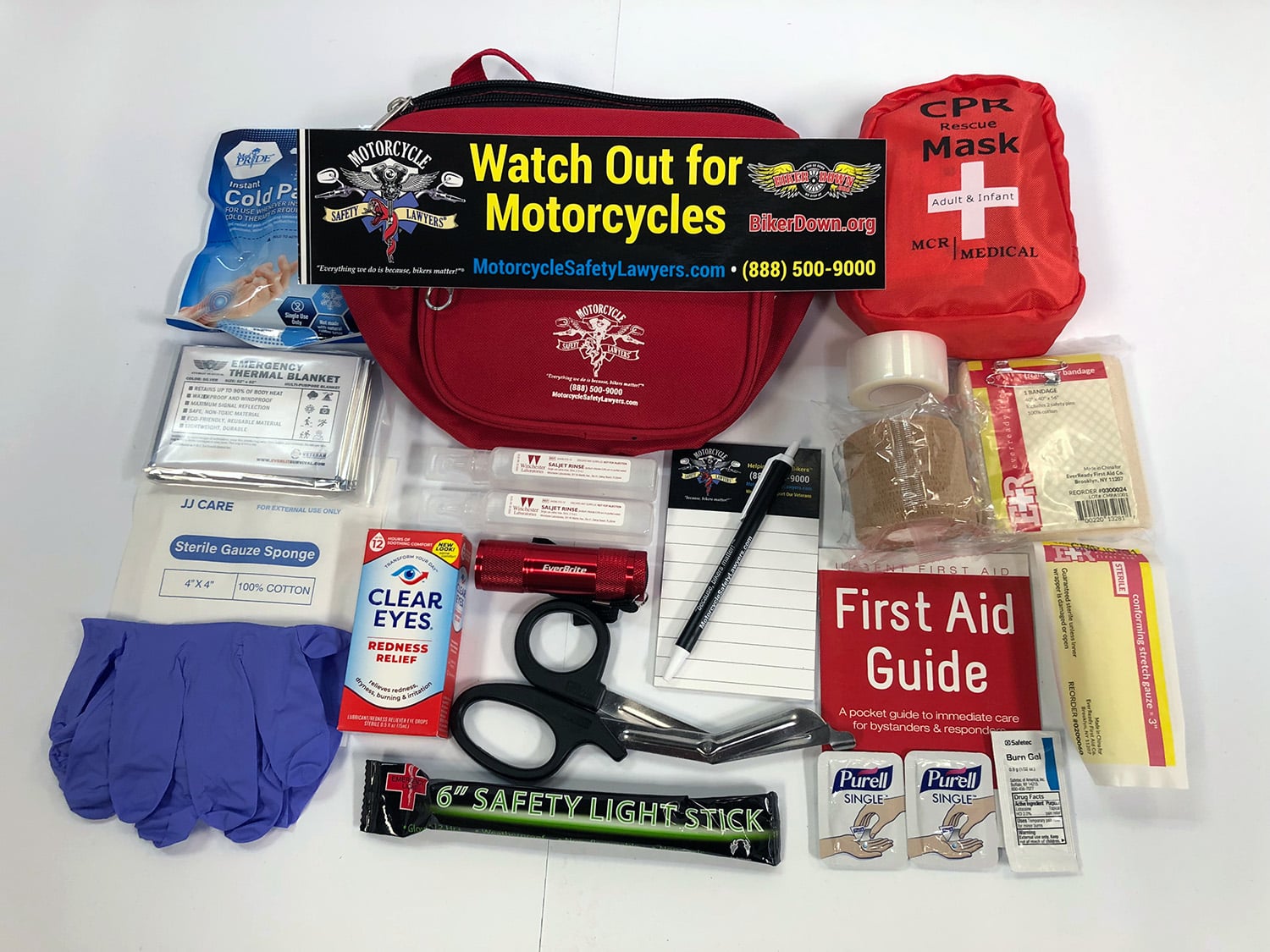The Illinois Good Samaritan Law: What You Need to Know
Last updated Tuesday, August 26th, 2025
The Illinois Good Samaritan Law protects people who help in emergencies from being sued. It encourages you to assist without worrying about legal consequences for honest mistakes. Keep reading to find out what protections this law offers and how it applies to you.
Key Takeaways
- The Illinois Good Samaritan Law protects individuals who assist during emergencies from legal liability, encouraging community participation in critical situations.
- Good Samaritans are shielded from civil liability unless their actions are grossly negligent or willful, and implied consent allows assistance to unconscious victims.
- Specific provisions under the law, such as protections during drug overdose situations and the use of naloxone, aim to enhance public health by reducing the stigma of seeking help.
Have You Been Injured in a Motorcycle Accident?
If you need a motorcycle accident lawyer, talk to an experienced lawyer who’s been helping injured bikers for over 35 years.
Overview of the Illinois Good Samaritan Law
The Illinois Good Samaritan Law encourages individuals to assist during emergencies without fearing legal repercussions. Whether you’re a passerby witnessing a car accident or a neighbor responding to a distress call, this Illinois law protects you from liability for negligence when you step in to assist. The primary goal is to motivate bystanders to offer help without hesitation, knowing they won’t be the target of legal battles for their compassionate acts.
While Good Samaritan laws exist in all states, the Illinois version has unique nuances. A key aspect is that individuals are not legally required to assist in emergencies, but those who choose to help are shielded from liability if they act in good faith. This means that even if things don’t go perfectly, as long as your intentions are pure and you don’t act recklessly, you’re protected.
The law also promotes community engagement by enabling individuals to provide immediate help while waiting for professionals, which improves emergency response times. Fear of litigation can deter people from helping, but the Illinois Good Samaritan Law addresses this, fostering a more supportive and proactive community.

Key Provisions of the Illinois Good Samaritan Act
The Illinois Good Samaritan Act protects individuals who render emergency assistance in good faith from civil liability. Crucially, individuals are shielded from civil liability unless their actions are deemed willful or egregiously negligent. This means that as long as you’re trying to help and not intentionally causing harm, you’re generally protected.
Consent is crucial when providing aid. In Illinois, if a person is unconscious, there’s an understanding of implied consent, meaning you can proceed with rendering emergency assistance. This ensures good Samaritans can act swiftly without waiting to obtain permission, which is vital in life-threatening situations, including acute cardiopulmonary insufficiency, cardiac arrest, and cardiopulmonary resuscitation.
The Act also protects those who provide emergency instructions through established communication systems. Whether you’re giving directions to a 911 operator or guiding someone over the phone, you’re protected from liability for these acts or omissions, which include numerous protections under the Emergency Telephone System Act. This broad scope of protection encourages more people to step up and offer help in various capacities.
However, individuals who choose not to provide assistance face no liability. While the law does not impose a legal duty to rescue, it ensures that those who choose to help can do so without fear of legal repercussions, fulfilling a moral obligation. This balance respects individual autonomy while encouraging voluntary assistance.
Legal Protections for Emergency Medical Technicians (EMTs)
Emergency Medical Technicians (EMTs) play a critical role in providing urgent medical attention during emergencies. The Illinois Good Samaritan Law grants them immunity from civil damages when administering emergency care, provided their actions do not involve willful or wanton misconduct. This protection allows emergency medical technician to perform their duties without constantly fearing lawsuits for unintentional harm, especially in the context of emergency medical services. If someone is in a critical situation, they should seek emergency medical assistance promptly.
EMTs can be held liable if they fail to follow established protocols. If a victim proves an EMT did not adhere to standard procedures or acted with intentional harm, liability may arise. This ensures accountability while still protecting those who perform their duties with due diligence.
Limiting EMTs’ exposure to lawsuits encourages them to act decisively in emergencies. This legal safeguard ensures EMTs can focus on providing the best possible care without fearing legal consequences.
Good Samaritan Law and Drug Overdose Situations
Drug overdose situations present unique challenges, and the Illinois Good Samaritan Law addresses these with specific provisions. Those who call for help during an overdose are protected from charges related to the Controlled Substances Act. This protection encourages people to seek emergency assistance without fearing prosecution for certain possession offenses.
The law grants limited legal immunity to those who report a drug overdose, emphasizing saving lives over penalizing drug use. This approach reduces the stigma of seeking help during overdoses, ultimately improving public health outcomes and assisting law enforcement officers in their efforts to protect people.
Naloxone, a medication used to counteract opioid overdoses, is frequently administered by first responders and community members alike. Under the Illinois Drug Overdose Prevention Program Law, those who administer naloxone are protected from civil or criminal liability, further encouraging its use in emergencies.
Have You Been Injured in a Motorcycle Accident?
If you need a motorcycle accident lawyer, talk to an experienced lawyer who’s been helping injured bikers for over 35 years.
Using Naloxone in Opioid Overdoses
Naloxone’s role in reversing opioid overdoses is life-saving, and Illinois has made it accessible to non-medical professionals. Pharmacies can provide naloxone under a statewide standing order, ensuring access without a prescription for those at risk of opioid overdose. This accessibility is crucial for timely intervention during an overdose.
The Illinois Department of Human Services oversees training programs to educate individuals on administering naloxone. These training programs, like the Drug Overdose Prevention Program, empower community members to act effectively during emergencies by:
- Teaching administration of naloxone via nasal spray or injection
- Explaining how naloxone rapidly reverses the effects of an opioid overdose
- Providing a critical window for further medical assistance
Liability and Limitations Under the Illinois Good Samaritan Law

- Good Samaritans cannot be held liable for negligence unless their actions were grossly negligent.
- Minor mistakes are generally protected.
- Severe lapses in judgment can lead to liability.
Acts of gross negligence or willful and wanton misconduct disqualify individuals from the law’s protections. For instance, if a person acts in a way a reasonable person would consider extremely careless, they can be held liable under certain circumstances. This ensures that while Good Samaritans are protected, a standard of competence and care must be maintained, particularly in cases of willful and wanton behavior.
EMTs and other professionals must adhere to established protocols to maintain their immunity from civil damages. Additionally, impairment, such as being under the influence of drugs or alcohol, can disqualify a person from liability protections. This reinforces the need for sober and competent assistance during emergencies.
Encouraging Community Involvement and Public Health
The Illinois Good Samaritan Act encourages community involvement and enhances public health. By providing legal protections for those who act in good faith during emergencies, the law reduces hesitation and fosters mutual support through generous and compassionate acts. This is crucial in emergencies where timely assistance can significantly influence outcomes.
The law aims to reduce the stigma associated with seeking help during drug overdoses. Encouraging bystanders to intervene without fearing legal repercussions, the Illinois Good Samaritan Law promotes a more proactive and supportive community, ultimately improving public health.
Seeking Legal Advice After an Incident
Despite the protections offered by the Illinois Good Samaritan Law, seeking legal advice after providing emergency assistance is essential. Individuals who act in good faith but inadvertently cause harm could still face lawsuits. Consulting a legal professional can help navigate potential civil liabilities and ensure you understand your rights and responsibilities.
Legal counsel is especially crucial if any harm was caused during first aid emergency assistance for a person seeking an emergency situation. Professional guidance can help you address legal challenges and provide aid, knowing you have taken necessary steps to protect yourself in the event of an emergency occurring.
Frequently Asked Questions
What is the primary purpose of the Illinois Good Samaritan Law?
The primary purpose of the Illinois Good Samaritan Law is to encourage individuals to assist in emergencies by protecting them from legal liability. This law aims to promote timely help and support for those in need during critical situations.
Are individuals required to assist in emergencies under the Illinois Good Samaritan Law?
Under the Illinois Good Samaritan Law, individuals are not required to assist in emergencies; however, those who do choose to help are protected from liability as long as they act in good faith.
Can EMTs be held liable for their actions under this law?
Yes, EMTs can be held liable for their actions if they engage in willful or wanton misconduct or fail to adhere to established protocols.
How does the law protect individuals who report drug overdoses?
The law offers legal protections and limited immunity to those who report drug overdoses, allowing them to seek emergency help without the fear of prosecution for specific drug possession offenses. This encourages prompt action in critical situations.
What should individuals do if they face legal challenges after providing emergency assistance?
If you face legal challenges after providing emergency assistance, it’s essential to seek legal advice to navigate potential civil liabilities and understand your rights and responsibilities. This proactive step will help protect you in any legal matters that may arise.
Related Article(s)



